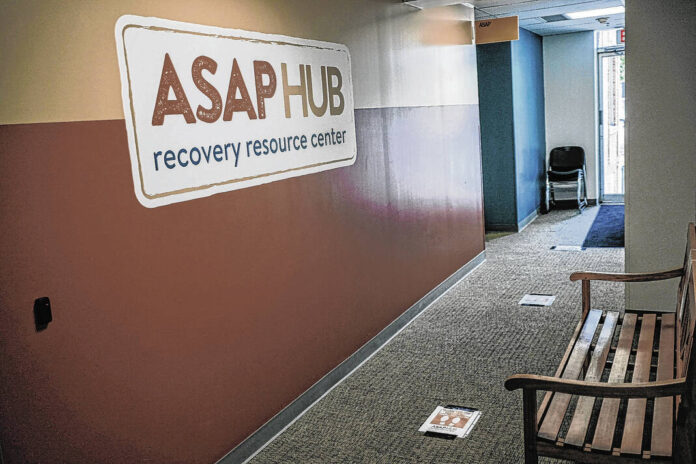
Mike Wolanin | The Republic A view of the hallway leading to the entrance of the Alliance for Substance Abuse Progress Bartholomew County Hub in Columbus, Ind., Monday, June 15, 2020. Mike Wolanin | The Republic
Local officials are hoping to secure additional funding from Indiana’s share of national opioid settlements to combat the substance use crisis in the community after state officials made additional funds available.
Last week, state officials announced that they had made an additional $25 million of the state’s share of nationwide opioid settlements available to local governments through a one-time matching grant, according to the Indiana Family and Social Services Administration’s Division of Mental Health and Addiction.
The grant seeks to support evidence-based prevention, treatment, recovery, harm reduction, behavioral health workforce, enforcement, jail treatment, recovery residences and other community services and initiatives, according to state records.
Local officials, including the Alliance for Substance for Abuse Progress, or ASAP, and others, plan to submit a request for funding through the grant to expand current programming aimed addressing substance use disorders, as well as potentially launch new programs, said ASAP Executive Director Sherri Jewett.
Currently, ASAP is reaching out to local organizations and officials to gauge interest and needs, including officials with the Bartholomew County Jail Treatment Program and organizations that are operating recovery homes and treatment facilities, Jewett said.
The deadline to submit the funding request is Feb. 28.
“It’s really exciting news,” Jewett said. “…It really provides us an opportunity to expand the programs that we have and introduce new programs without having to go back to the community and say, ‘We need more money.’”
The funding for the matching grant comes from Indiana’s share of nationwide settlements with a major pharmaceutical manufacturer and the nation’s three largest drug distributors over their role in the opioid addiction crisis.
In February 2022, drugmaker Johnson & Johnson and three distributors finalized nationwide settlements totaling $26 billion to resolve about 3,000 lawsuits from state and local governments who sought to hold the companies liable for an epidemic that has been linked to the deaths of more than 500,000 Americans over the past two decades, The Associated Press reported.
The settlements resolved lawsuits that alleged that the companies helped fuel the opioid crisis, including downplaying the risk of addition to prescription opioid pain medications, among other claims, according to wire reports.
Under the terms of the settlements, Johnson & Johnson has nine years to pay its $5 billion share, including up to $3.7 billion during the first three years. The distributors — AmerisourceBergen, Cardinal Health and McKesson — agreed to pay their combined $21 billion over 18 years.
In July, the Indiana Attorney General’s Office announced that Indiana would receive $507 million as part of a multi-state agreement. The amount sent to each state under the opioid settlement depends on a formula that takes into account the severity of the crisis and the population.
Local governments in Bartholomew County will collectively receive a total of $3.2 million through 2038 as part of the settlements, including $3 million for Bartholomew County, $194,011 for the city of Columbus and $9,343 for the town of Hope, according to the attorney general’s office.
Jackson County will receive about $1.66 million in settlement funds over the course of the next 16 years, while Jennings County will receive about $968,813.
Any funds that the local officials receive through the one-time matching grant would be in addition to the local community’s individual share of the opioid settlement.
Applicants are required to provide matching funds, which local officials say could be an advantage for Bartholomew County.
The matching funds can come from any local source, including local distributions from the national opioid settlement, federal American Rescue Plan funds, local general funds, private contributions or philanthropy dollars, according to the request for funding form for the grant.
“The really important thing to know for Bartholomew County — and I don’t know that we say this enough — is that we were forward thinking enough that we’ve already invested, so the money that goes to the ASAP programs, the jail treatment program, etc., those are already matching funds,” Jewett said. “So instead of us only having the opioid settlement dollars, we can use the local income tax money that the county has invested in the city has invested as a matching funds, and hold off on using the opioid settlement dollars at this point.”
The new funding opportunity comes amid a deepening tragedy that has claimed the lives of 192 people in Bartholomew County since 2015.
As of late December, 39 people in Bartholomew County had died from overdoses last year — the highest figure on record and up from 33 in 2021 — according to most recent figures from the Bartholomew County Coroner’s Office.




